




At 42 seconds in the clip below, the red, blue and white helicopter can be seen hovering over the ravine, winching up a basket containing Nora’s body, and a rescue worker.










At 42 seconds in the clip below, the red, blue and white helicopter can be seen hovering over the ravine, winching up a basket containing Nora’s body, and a rescue worker.





What does it feel like to be the person lost, and alone, for days, then weeks on end? Rita Chretien was stranded for 47 days, and survived. This is her story.
Missing Canadian tourist Rita Chretien found alive in Nevada – The Guardian
Rita Chretien back in Canada – CBC
Seven weeks in wilderness: Rita Chretien recalls her nightmare – The Globe and Mail
Rita Chretien says she was ready to die – Global News
Missing Canadian walked 9 miles before collapsing – Elko Daily
Rita Chretien, who was 56 at the time, was on the verge of starvation when antler hunters riding ATVs spotted the couple’s van. She survived the nearly seven-week ordeal on trail mix, hard candy and melted snow.
Albert Chretien’s remains were found west of his stranded vehicle and on the north side of Merritt Mountain, Elko County Sheriff’s detective Dennis Journigan said. Even though he was only 100 yards off the highway, the hike from the van would’ve been incredibly strenuous in 10 feet of snow, Journigan said.
On August 5th, after Nora Quoirin had been missing for one day, family representatives in Ireland and France started up two separate GoFundMe pages. They were ostensibly started for the purpose of “Finding Nora”, but the descriptions were explicit that funds raised might also go to paying for family members’ flights to and from Malaysia, as well as “unforeseen expenses”.
I seem to remember the page originally stating something about paying for accommodation as well, but I don’t have a screengrab of that section of the original. If it was part of the original it isn’t now.

Soon after starting the GoFundMe, the person who started it – Meabh’s sister and both her children – traveled to Malaysia. Although the GoFundMe states the reason for the fundraising was to “participate in the search and rescue effort”, on the ground there is no evidence this happened. There are no photos of any family members searching the forest, although there are photos of others guests’ families doing so.

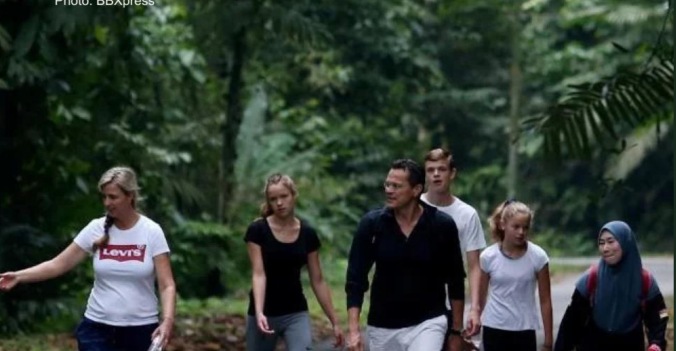
Nora’s body was discovered at midday on August 13th. The GoFundMes that were started to #FindNora nevertheless continued taking donations for the next two weeks, until it was deactivated on August 27th.
The Quoirin family, meanwhile, had already returned from Malaysia to an undisclosed location, presumably around August 20th, though details on when they left Malaysia remain sketchy. News reports suggest Nora’s body was flown home as early as August 17th.
On August 20th, the Lucie Blackman Trust closed the official fundraising efforts on their official page, and thanked the public for their overwhelming support while inviting them to join another initiative – the LBT Global Volunteer Network – with fundraising as part and parcel of their stated objective.

Matthew Searle, the Quoirins spokesman, also diligently went to the closed group on Facebook – Nora Quoirin: Uncovering the truth – and posted this message, explaining the delay in closing the GoFundMe pages.

It has subsequently come to light that the Quoirins hired a lawyer in Malaysia on the same day the twin GoFundMe’s were set up, and have also secured representation with a lawyer in France.
Thus far it appears they have not felt it necessary to do a second autopsy or pay for any additional investigation into their daughter’s “abduction”, even though Nora’s clothing was never found. They have been saying all along that they believe foul play was involved, and that Nora was abducted.
It would be good to get full disclosure on precisely how and where the money raised for the purposes of finding Nora was actually spent, and also whether the reward promised the day before Nora was found dead, was paid by the hikers who found her in the jungle. And if it wasn’t paid to the hikers, what happened to that money?
First of all, when doing Statement Analysis it’s important to be transparent about source material. Oddly, it’s quite hard to find this particular video on YouTube, and there aren’t many of them.
My Statement Analysis is derived from a strongly-worded Statement Analysis by an anonymous person who posted theirs at this link. Mine won’t be thorough; just a glossing through and highlighting a few points of consensus, and debate.
The Analysis starts off with the right strategy, transcribing the entire 107-word statement. Then it commences with analysis of the salutation.
Good morning, everyone.
This is unexpected as at the time, her daughter’s whereabouts are supposed to be unknown. It is unexpected from a mother in panic not sure how her daughter’s condition is and whose hands she is in. How can this morning be good?
This is an early indication of fairly substantial cognitive bias from the writer. Because Meabh doesn’t say “Good morning.” She starts off with “Morning.” Those around her answer, “Good morning”.
I do agree that even a polite greeting, with or without the “good” may feel a little strange under the circumstances. We don’t expect to hear a salutation at the beginning or end of a 911 call. But this is different. Even though it’s an emergency it’s a long emergency. It’s protracted and the setting is different. It’s personal with a lot of people standing beside and around them. So in my opinion, the salutation is the natural thing to do, even though the situation is stressful and urgent.
There are many other aspects to address, including the frequent use of “everyone”, “every one” and “everything” in this brief statement.
Since I don’t typically do this sort of analysis in blogs, I won’t elaborate in further depth on the conventions, semantics etc. To do justice to statement analysis one has to be incredibly thorough, and that requires a chapter on the subject, at least.
But I do want to correct a few other errors in this poster’s analysis.
We knew you are searching night and day for Nora.
She said “knew” in the past tense. What could be the reason? I needs to be flagged though it could be a simple error. It could also express a process of thinking about how she felt at a previous time. She knew they would search for the child. Which time frame was she referring to? And why is it significant enough to show up in her speech?
Meabh is Irish, so her pronunciation is different. I don’t hear “knew”, I hear “know”, although the locution is somewhat pinched and high-pitched. While mismatches in tense are a typical feature of deception, that’s not the case here.
We see you working so hard and and also praying with us, being with us.
Bringing in deity needs to also be flagged…
Yes and no. In this instance, this was the morning of an important Muslim holiday, and so prayers were to be expected. We also know there were prayers the previous morning too [Friday] attended by the chief of police, where flyers were also handed out.
I do feel feel uncomfortable about the phraseology and the reference in this section, however. “Praying with us”? The Quoirins aren’t Muslim, and if we want to get technical, it was more likely the Quoirins were praying with the police/soldiers, to Allah, than the other way round. One could argue that the semantics loosely refer to “praying together”, but it doesn’t hold because of how Meabh frames the rest of the sentence:
We see you working so hard and and also praying with us, being with us.
Broken down it’s reduced to:
We see you praying with us.
Unconsciously Meabh may be communicating:
You see [referring to those watching] you [them] praying with us.
It also feels like “being with us” following on from “praying with us” is done as a modifier, to admit they weren’t necessarily being prayed with, but accompanied in prayer [being with us]. If this is an error, it might indicate nervousness from the child’s mother, which under the circumstances wouldn’t necessarily be a sign of anything. On the other hand, Meabh is a professional speaker. So this one is hard to read.
Overall it feels unnecessary to be talking about prayers, or what the Quoirins have been doing. It’s more important what the SAR teams do today that’s going to be different and more effective compared to the fruitless six days preceding Search Day 7. Nora’s life is on the line.
So regarding the prayers etc. I wouldn’t call this a red flag, but it might be a grey one.
and thank you so much, terimah kasi.
Again she is thanking them. This time also in their language. She has now thanked them multiple times and it appears genuine, so the question is what she is thankful for. She told us. For being there with them. Not with Nora. She also might be thankful for not having discovered anything.
I concur, there is too much gratitude when the police haven’t delivered anything, and there’s too much consideration in this sign-off in the local language. There may be a simple reason for this. It’s possible Meabh’s statement wasn’t entirely voluntary, nor off-the-cuff. She may have been asked, or told, to publicly thank the police given how roundly the police were being criticized and undermined [and thus losing face] in the media.
We might think that by thanking the authorities, Meabh is just being polite, but we’d expect a mother in this situation to be more focused on her child, and on urging the troops to spend more time looking for Nora, than on being with them, praying with them, or thanking them.


SEREMBAN, 11 Ogos — Kumpulan Badan Bukan Kerajaan (NGO) Kenny Chan (tengah) bersama rakan lain turut hari ini membantu misi pencarian seorang remaja warga Ireland Nora Anne Quoirin, 15, yang dilaporkan hilang pada 4 Ogos lalu. Operasi SAR yang telah memasuki hari kelapan tetap diteruskan seperti biasa dengan jumlah kekuatan anggota operasi seramai 317 anggota dari pelbagai agensi termasuk pasukan elit Polis Diraja Malaysia (PDRM) Komando VAT 69. –fotoBERNAMA (2019) HAK CIPTA TERPELIHARA
Personally I would expect a lot more emotion from both parents, especially since we know they disagreed with the authorities throughout Nora’s disappearance on whether there was an abduction or not. If they didn’t believe Nora wandered off, then this was an opportunity to petition for a search through local villages that had not yet been searched, or to compile a list of pedophiles in the area and go after them. There’s none of that here. Meabh’s getting advice from missing child experts – why not impart some of that expertise to a captive audience now that she has the opportunity?
There’s something else.
Nora’s name is only mentioned twice in the entire statement, and very little information of any value – including about her – is provided to the troops. This is Meabh’s chance to inspire the troops and give them the tools and insight about her daughter that might save her life. Instead she elects to thank the SAR teams. Sebastien elects to say nothing.
I agree with the writer that Meabh had to have been painfully aware of Nora’s limitations, and so the odds were Nora was either already dead when this speech was made, or not long after.
I disagree that Meabh knew or believed for a fact that Nora was dead, because I do think it’s possible Meabh was led to believe Nora was abducted. If those circumstances were true, regardless of how probable they were in reality, then Nora – as far as Meabh and Sebastien were concerned – could have been alive after all. The real question is whether Meabh truly believed Nora was abducted.

On the surface, cultural differences are obvious differences when incidents take place in foreign countries. But do they have a material impact on the outcome? Do cultural differences mean investigations are conducted differently? I would wager they do, but not in the ways we tend to think.
Obviously the very notion of “cultural differences” is a sticky and sensitive area, and we need to tread carefully as we navigate into this minefield, but we wouldn’t be doing our due diligence as True Crime Rocket Scientists if we didn’t dive below the surface of this particular issue.
Since culture is invariably subjective, I hope you don’t mind me indulging in my personal travels through Malaysia some years ago. Before we deal with that, though, I want to be quite plain about one thing. In terms of the meat and potatoes investigation stuff, there’s not much difference between a British, American, Portuguese, Italian or Malaysian person [cop or otherwise] walking on the ground, looking for someone that has gone missing. So that’s not the issue here.
It’s at higher levels, the level of institutions, organisations and power structures, that culture is more relevant. To explain how this works, I’m going to provide some personal insight based on actually being in Malaysia in general, and Kuala Lumpur in particular.
I spent a New Year’s eve in the centre of Kuala Lumpur, in the shadow of the Petronas Towers with my girlfriend at the time, a lawyer from Singapore. It was one of the strangest New Year’s ever, but it took a while it figure out why. For one reason, alcohol is banned in Malaysia. Not banned to infidel travelers mind you, just to the local mostly Muslim population.

New Year’s that night felt weird because everyone was so well behaved. People arrived in great crowds to watch impressive fireworks shooting off and around the towers. Everyone oohed and aahed, then went home. No harm done. But no Hogmanay either.
In our hotel room in Kuala Lumpur an arrow on the ceiling provided direction to Mecca, Islam’s holiest site: . Muslims pray daily, facing in that direction while doing prostrations.

Wearing a bikini is regarded as indecent exposure in some states, and censorship is pretty impressive – you’ll be hard pressed to find The Dark Knight [too anarchist], Beauty and the Beast [homosexual references] or Wonder Woman [leading actress Gal Gadot served in the Israeli army].
Jaywalking is also an offence, especially if and where there are pedestrian crossings and walkways provided. When you’re in Malaysia, there’s a subtle – and sometimes not-so-subtle – sense that you’re not in Kansas any more. You have to maintain a modicum of behaviour, not one that’s necessarily beyond the norm, but the walls seem to be moved in a little closer than in other countries.
In Singapore, at least when I was there, homosexuality and oral sex was illegal, as was littering and jaywalking. I remember asking my girlfriend, “But what if you drop a scrap of paper by mistake?”
What does this have to do with the Quoirin case? Nothing, and everything. Nothing, because if anything the Malaysians are quite strict in their attitudes. So the idea that they woudn’t treat a high-profile disappearance with the requisite urgency is complete anathema. Everything, because when you’re a foreigner in Malaysia, although you’re granted some concessions, you’re also expected to toe the line. You do as it’s done there, and things are done there according to their protocols and procedures, not yours.

Most important, and this is a generalisation: there is perhaps a stronger sense of us vs them [from locals towards tourists and vice versa] in a Muslim country like Malaysia than in secular countries, for example the Netherlands and France. That’s not to cast aspersions on Malaysia alone, South Korea and Japan have similar attitudes to foreigners as “outsiders”, a lot of Asia is like that, even relatively laid back countries like Thailand and the Philippines.
How do cultural differences play out in other countries in the region? Thailand to the north feels a lot more liberal than Malaysia, perhaps because their culture is based on “go with the flow” Buddhist beliefs. The Thais definitely give foreigners a longer leash to play with. Even so, in Thailand just as in most Asian countries, if you’re caught with recreational drugs you can be jailed, and in many cases executed.


So when the Quoirins said they thought their daughter was abducted, one can expect, even from a cultural point of view, that the authorities would have no problem contradicting that claim. Not only was such a claim culturally inappropriate, it was – arguably – politically inexpedient. It was also unlikely.
But I want to focus on how this cultural appropriateness, when it came to the Nora, was treated very differently by the media in Britain versus Malaysia. I would argue that these differences can be explained in part due to cultural differences.
When we examine the media narrative, we see two narratives emerging almost from the get go, the Abduction Narrative in the western media, and a more conservative, more innocent explanation – the Lost Nora Narrative – in the local media.
One could also confidently predict that the pet narrative in the circus-like Madeleine McCann saga – the Paedophile Abduction Narrative – simply wouldn’t fly in Malaysia as it might in the west. This isn’t because paedophiles cease to exist in Malaysia, it’s just that the cultural conversation and the media in the East isn’t nearly as bottom-dwelling as in the West.

Even the Portuguese were appalled to be accused by the British media of having paedophiles running amok through the Algarve, something that says a lot more about the British tabloids and cultural imagination in that country, than the state of things on the ground in Portugal.
To their credit, the Malaysians didn’t exclude the possibility of an abduction, even though – given the evidence, and the outcome – they had every reason to. It was a fanciful theory imposed on them by the outside world, and not least of all, the family of the lost child.
One wonders if the authorities had gone with their gut, ignored the foreign influence and focused on Lost Nora, regardless of how she got to wherever she was, whether she may have been found sooner, and perhaps even saved.
It may well be that by being nice, by not being assholes and investigating this case the way they damn well wanted to, the search for Nora was compromised.
In this sense, culture may be relevant after all. Malaysia may have felt culturally insecure given the unrelenting media spotlight focused on them during the disappearance. When the media carried advice courtesy of Britain’s “missing children experts”, perhaps they did feel they needed guidance. Who wouldn’t 3, 4, 7, 9 days into a frustrating, fruitless search?

But it was also more fraught than it may have appeared on the surface. If they didn’t follow the instructions emanating from Britain, and the experts turned out to be right, Malaysia would have egg on its face.
On the other hand, if they jumped through the hoops they were told to jump through and still didn’t find Nora, then they would look foolish too. In the end the authorities took the middle road, following their own theory and splitting up their resources to chase the wild goose that was the Abduction Narrative. The enormous resources brought to bear in this search – over 350 on the last day – clearly show that the one thing Malaysia can’t be accused of is a lack of urgency or commitment in this case. 
When Meabh Quoirin addressed the crowds on the driveway of The Dusun Resort, she mentioned a festival.

MEABH: We know you’ve given up your time especially at a special festival time to be with us here. It means the world to us.
Meabh was referring to the Festival of the Sacrifice [referred to in Spain as the Festival of the Lamb]. Wikipedia’s generic description is as follows:
Affluent Muslims who can afford it sacrifice their best halal domestic animals (usually a cow, but can also be a camel, goat, sheep, or ram depending on the region) as a symbol of Abraham’s willingness to sacrifice his only son. The sacrificed animals have to meet certain age and quality standards or else the animal is considered an unacceptable sacrifice. In Pakistan alone nearly ten million animals are slaughtered on Eid days costing over US$2.0 billion.
Wikipedia also provides an origin story for this ritual sacrifice, which is observed by numerous faiths, worldwide.
One of the main trials of Ibrahim’s life was to face the command of God to sacrifice his dearest possession, his son. The earliest Islamic traditions identify Isma’il (Ishmael) as the son who was sacrificed. When Ibraham attempted to cut his son’s throat on mount Arafat, he was astonished to see that his son was unharmed and instead, he found an animal which was slaughtered. Ibraham had passed the test by his willingness to carry out God’s command.
What was a little strange about Meabh’s comment was that the festival hadn’t started yet. The first day of the festival was only due to start on the evening of August 10th.
Let us, for the sake of argument, imagine there is an abductor phantasm in this story.
Bear in mind, it’s an opportunistic crime, because the criminal hasn’t had time to get to know the family because they’ve only just arrived at the hotel.
The phantasm waits until everyone is asleep, and either opens the kitchen window, or finds it already open. Oh look, right inside, on the table, is an expensive Apple MacBook. The phantasm elects to ignore it, and goes in search of his prey. On the way out, the MacBooth is right beside him. But again, he elects not to take it. Our phantasm isn’t an opportunist or a burglar.

One might argue the MacBook wasn’t on the table when the phantasm arrived, but only left out on the desk after he left. Okay then, so you really believe an abductor came through the window, which is still open, and stole your child, and your plan is to sit right beside that window, with your back to it, and then leave your computer there…?
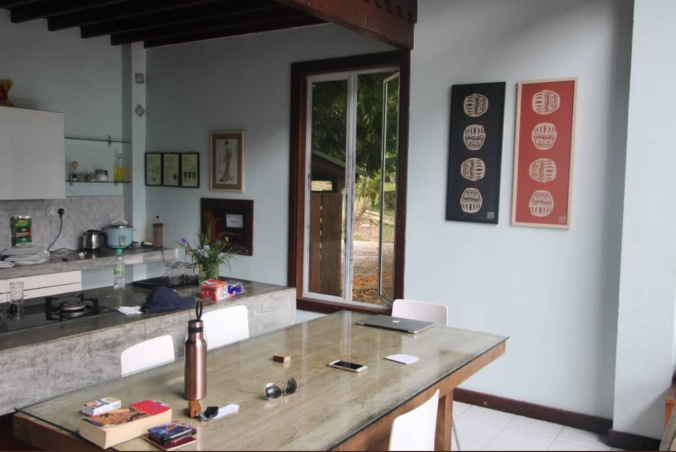
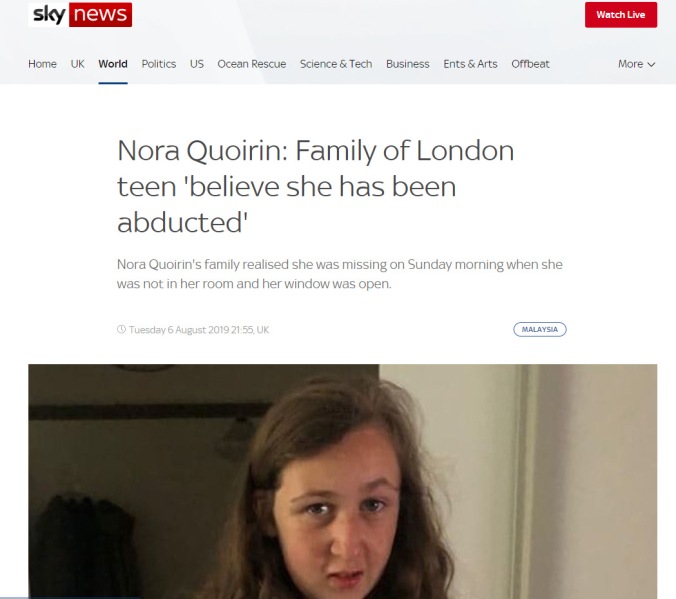
For reference, in 25 0000 missing cases, more children got lost than the less than 1% that were abducted by strangers. We live in a strange world where, when something happens to a child, our first thought is a child abduction, when it should be our last thought.
More than four times as many abductions by strangers are committed by family members. So the idea that looking to parents when something happens to a child is anathema is patently ridiculous. We should look to the parents first, and look to exclude them, before turning our gaze towards stranger abductors.
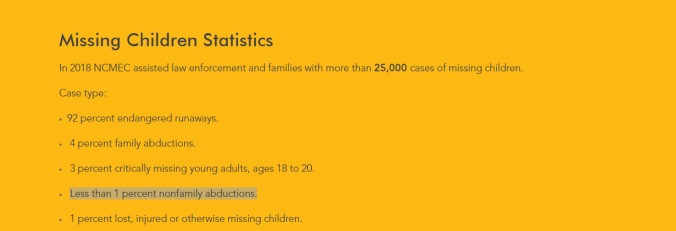
It is also nonsense to conflate the terms Pedophile Abductor. Abductions aren’t always carried out for reasons of sexual assault. According to the New York Times:
Sometimes, children are abducted for ransom or because they are caught up in another crime like burglary, or carjacking, when an abductor drives off with a child in the back seat. On other occasions, children get trapped in gang violence, sometimes as acts of revenge.
Last month in Philadelphia, Erica Pratt, 7, was abducted by men who demanded $150,000 in ransom. The police suspected that the abduction might have stemmed from a feud between drug dealers. Erica escaped after chewing through the duct tape that bound her hands and feet.
When we refer to a preexisting condition, we mean besides the holoprosencephaly. A reader on this site recently mentioned an important point. It has to do with body weight. One way to track Nora’s health would be to simply examine a timeline of photos, and estimate whether or not there are significant weight fluctuations, especially in the last few months of her life.
Nora appears to have a healthy weight in the image with her mother, perhaps the most frequently used image by the media. But in other images, Nora seems to be a lot thinner.

Nora’s physique is also related to those of her parents, both of whom are skinny.
Again, we have no images of Nora in Malaysia to work with. Strangely, all the images provided to the media thus far have been undated, although this one [below, which appears to be Nora on her 15th birthday] can be dated theoretically. Any images of Nora posted on Facebook can be dated theoretically too. But even Nora’s exact birth date [sometime in 2004] is currently unknown.
One site lists her weight as 55 kilograms, or 121 pounds. Her weight based on the autopsy report is also currently unknown.

The McCann Rule-of-Thumb is raise money, exert pressure, and remote control an investigation from abroad by having your superior country’s resources criticize every aspect of the investigation.
Make sure the case stays in the media because that will focus local cops on searching and investigation. [No, it will focus them on reading the tabloids criticizing what they’re doing].
The McCanns Rule-of-Thumb also suggests waiting as long as possible to give statements to the police, and telling the police to follow the leads you give them. In short, control the narrative. Also, make sure siblings don’t talk to the investigators, as this might actually get it on the right track.
The McCann-Rule-of-Thumb requires setting up PR spokesmen, and not dealing with the police but communicating instead to the public, especially through spokesmen, book deals, documentaries etc. All the profits from this naturally go to the search for the missing child, until it turns out it’s mostly used to pay for PR, legal fees and occasionally, an expensive mortgage.
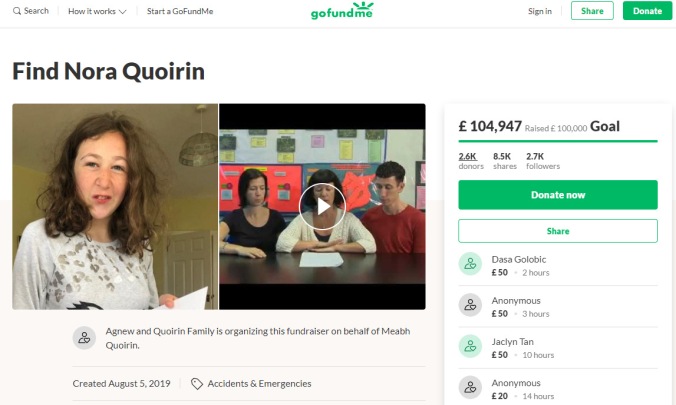

True Crime Analysis, Breakthroughs, Insights & Discussions Hosted by Bestselling Author Nick van der Leek
at home and further afield
True Crime Analysis, Breakthroughs, Insights & Discussions Hosted by Bestselling Author Nick van der Leek